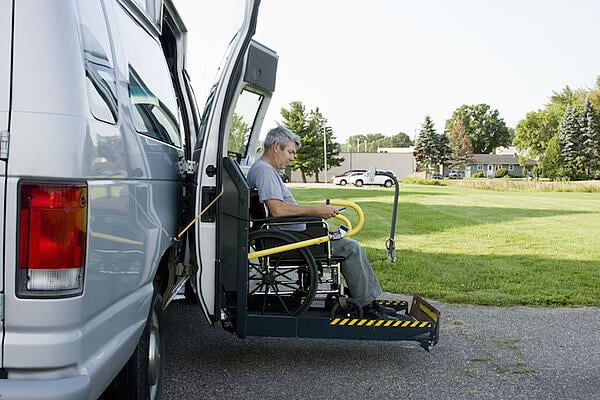Handi-Care Transportation Service Tuscaloosa AL are essential to ensure accessibility, independence, and equal opportunities in various aspects of life, including public spaces, transportation, housing, education, and employment.

This comprehensive guide explores the wide range of accommodations available to wheelchair users, the importance of these accommodations, and how they can significantly enhance the quality of life for individuals with mobility challenges.
Public Spaces and Infrastructure
Accessible Entrances and Exits
- Ramps and Elevators: Public buildings are often equipped with ramps and elevators to provide access to wheelchair users. Ramps should have a gentle slope and handrails, while elevators need to be spacious enough to accommodate wheelchairs.
- Automatic Doors: Automatic doors or doors with push-button openers are crucial for wheelchair accessibility. They allow easy entry and exit without requiring manual effort.
Restrooms
- Accessible Stalls: Public restrooms must have stalls large enough to accommodate wheelchairs, with grab bars, lower sinks, and reachable soap dispensers and hand dryers.
- Family/Companion Restrooms: These restrooms offer additional space and privacy for wheelchair users who may need assistance from a caregiver.
Signage and Wayfinding
- Braille and Tactile Signs: Signage with Braille and raised tactile characters helps wheelchair users who are visually impaired navigate buildings.
- Clear Pathways: Hallways and pathways should be wide and free of obstructions, with clear signage directing users to accessible routes and facilities.
Transportation
Public Transportation
- Accessible Buses and Trains: Public transit systems often have buses and trains equipped with wheelchair lifts or low-floor entry options. These vehicles also have designated spaces where wheelchairs can be securely fastened.
- Paratransit Services: Many cities offer paratransit services, which provide door-to-door transportation for individuals with disabilities who cannot use regular public transit.
Personal Vehicles
- Wheelchair Accessible Vehicles (WAVs): WAVs are specially modified vans or SUVs with ramps or lifts, allowing wheelchair users to enter the vehicle without transferring from their wheelchair.
- Driving Controls: For wheelchair users who drive, vehicles can be fitted with hand controls and other adaptive devices to enable independent driving.
Housing
Adaptable and Accessible Housing
- Universal Design: Homes built with universal design principles include features like no-step entries, wide doorways, and single-floor living, making them accessible to all, including wheelchair users.
- Modifications: Existing homes can be modified with ramps, widened doorways, roll-in showers, and lowered countertops to accommodate wheelchair users.
Independent Living Aids
- Smart Home Technology: Devices like smart thermostats, lighting, and security systems can be controlled via voice or smartphone, making it easier for wheelchair users to manage their homes.
- Environmental Controls: Systems that allow users to control their environment, including lights, doors, and appliances, from a wheelchair.
Education
Accessible Classrooms
- Seating and Desk Arrangements: Classrooms should have adjustable desks and sufficient space for wheelchair users to maneuver.
- Accessible Facilities: Schools must have accessible restrooms, labs, and libraries to ensure full participation in educational activities.
Support Services
- Personal Aides: Wheelchair users may have access to personal aides who assist with tasks and mobility throughout the school day.
- Assistive Technology: Schools should provide devices such as computer software, communication aids, and mobility equipment to support learning.
Employment
Workplace Accommodations
- Accessible Workstations: Adjustable desks, accessible entrances, and appropriately designed workspaces enable wheelchair users to perform their job duties effectively.
- Flexible Work Hours: Flexible scheduling or remote work options can accommodate medical appointments and reduce the physical strain of commuting.
Legal Protections
- Americans with Disabilities Act (ADA): In the United States, the ADA requires employers to provide reasonable accommodations and prohibits discrimination based on disability.
- Workplace Policies: Employers should have policies in place to ensure accessibility, provide necessary accommodations, and support inclusivity.
Healthcare
Accessible Medical Facilities
- Examination Rooms: Medical offices should have height-adjustable exam tables, accessible medical equipment, and sufficient space for wheelchairs.
- Patient Assistance: Staff trained in assisting wheelchair users and handling mobility aids ensure that healthcare services are accessible and respectful.
In-Home Healthcare
- Home Visits: Healthcare providers may offer home visits for wheelchair users who have difficulty traveling to medical facilities.
- Telehealth Services: Virtual consultations can provide convenient access to medical advice and follow-up care without the need to leave home.
Recreation and Leisure
Accessible Parks and Recreational Areas
- Accessible Trails and Paths: Parks should have paved paths and trails that are wide and smooth, accommodating wheelchair users.
- Inclusive Playgrounds: Playgrounds designed with ramps, adaptive swings, and sensory-rich equipment ensure that children using wheelchairs can participate fully.
Sports and Activities
- Adaptive Sports Programs: Many communities offer adaptive sports programs, including wheelchair basketball, tennis, and racing.
- Accessible Gyms and Fitness Centers: Gyms equipped with accessible equipment and facilities encourage wheelchair users to stay active and healthy.
Advocacy and Support
Support Organizations
- Disability Advocacy Groups: Organizations like the National Council on Independent Living (NCIL) and local disability advocacy groups provide resources, support, and advocacy for wheelchair users.
- Peer Support Networks: Connecting with other wheelchair users through support groups or online forums can provide valuable advice and emotional support.
Legal and Financial Assistance
- Legal Aid: Legal assistance is available for wheelchair users facing discrimination or accessibility issues.
- Financial Grants: Various grants and funding programs can help cover the costs of modifications, adaptive equipment, and other necessary accommodations.
Conclusion
Special accommodations for wheelchair users are essential for promoting accessibility, independence, and equal opportunities. From public spaces and transportation to housing, education, employment, healthcare, and recreation, numerous accommodations can significantly improve the quality of life for individuals who use wheelchairs. Ensuring that these accommodations are widely available and effectively implemented is crucial for fostering an inclusive society where everyone can participate fully and independently. Whether through legal protections, advocacy, or community support, continued efforts to enhance accessibility are vital for achieving equality and inclusivity for all
Handi-Care Transportation
2018 Inverness Pkwy, Tuscaloosa, AL 35405, United States
1-205-391-7994



